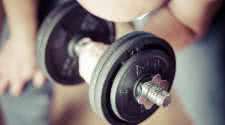Form for Injury Reform - Strict Tutonic Weight Training Form

Treat your Body like a well Oiled Machine
Injuries are fairly common in the sporting arena. (Who can forget the hamstring injuries of both Michael Johnson and Maurice Green in their 200 meter Olympic trial dual?) Flashy NFL linebacker Brian Bosworth saw a promising career end in a flop due to shoulder injuries. Bodybuilding is no exception - injuries are quite common. Some can be gruesome. Some injuries can put you out of commission for quite some time. And injuries have no respect - both professional-level and recreational bodybuilders can run the injury gauntlet in a career of lifting. However, it is possible to greatly reduce the likelihood of an injury by taking certain preventative measures. The top pros seem to avoid or minimize injuries because of certain techniques that they use in their training. What is their secret? One of their premier preventative measures is to use good form.
Form - Good and Bad
Good form has many benefits. It is the key to realizing solid muscle gains. Good form also produces muscles that are well formed. One of the body-builders known for the best form in his training, the current governor of California, is also known for having the body with the best form ever.And good form helps to prevent injuries. Porter Cottrell, multi-title holder (Night of Champions, etc.) points out the importance of good form, noting that it is key to "... stabilize your body before you lift the weight off the floor. Many injuries occur because people lift the bar, then try to adjust their bodies. By securing yourself first, you have better protection against injury; plus, if your body's stable, you are thinking properly You're concentrating on what you are doing before you start to lift. How will you be able to perform the movements efficiently if you're trying to adjust your body?" The importance of getting into proper position cannot be overemphasized. If your body is out of line before you begin a heavy lift, you invite a heavy injury. Porter sums up the essence of good form when he says, "It has to be quality, not quantity."
In addition to making sure that they are in a stable position prior to lifting, having made any adjustments before beginning the movement, the pros make sure that the weight is balanced. This is particularly true for dumbbell work. Barbells are not the only weight load that can hurt your body - heavy dumbbell work can also put you out of whack. Pro Jay Cutler points out: "Even motion minimizes the risk of injury, especially when you use heavy weights." Getting heavy dumbbells into position can be as tricky as doing the exercise. Jay emphasizes that good form evidenced in even motion with each heavy dumbbell is vital. When one dumbbell gets out in front of the other you are putting yourself in a dangerous position where an injury looms. Focus on immediately returning to good form with the workload spread evenly between the two dumbbells.
The Concentration Connection
Good form and intense concentration are highly connected. A commitment to good form may mean that you have to cut back on being a social butterfly in the gym. That means getting into the workout, not the workout scene. As King Kamali's workout partner points out: "King never talks when we work out." Focusing intently, concentrating on the exercise, is what helps put you into good form. This is true both during and between sets.Concentration is vital to maintaining good form toward the end of the set. This is when the tendency to cheat is most prevalent, and when an injury can most easily take place. You should not only be focused on hoisting the weight for those last few repetitions, you should concentrate on hoisting it in good form. Don't give up on good form in order to put out the last two reps. You will pay the price in two ways - the work on the muscles won't be as effective, and you just might injure yourself and not be able to lift for quite some time.
Why do some pros stay at the top year after year? One of the most essential elements is good form. It will pave the way to solid gains, and will help prevent those injuries that can derail your physique. Make good form the centerpiece of your training approach and keep your downtime to a minimum.